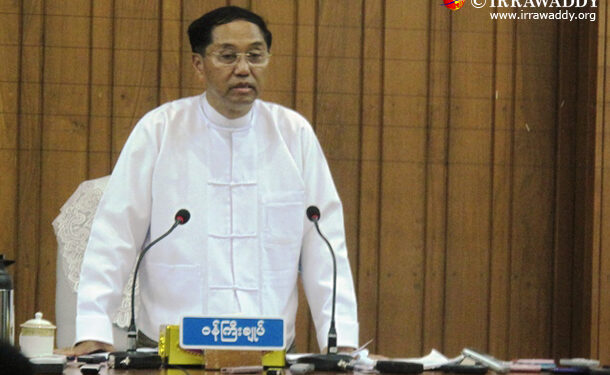Military appointees in Parliament nominated ex-Gen Myint Swe, chief minister of Rangoon Region, as the new vice-president of Burma on Tuesday.
He is set to replace Tin Aung Myint Oo, known to be notoriously corrupt and a hardliner, who stepped down after being diagnosed with cancer in May.
A graduate of the 15th intake of the Defense Services Academy (DSA) in 1971, Myint Swe, an ethnic Mon, rose steadily through the ranks to become commander of Light Infantry Division 11, which oversees security in Rangoon.
Fellow army officers who personally knew Myint Swe told The Irrawaddy that he gained promotions as he was an obedient soldier and faithful to the armed forces.
He was brought to the War Office in Rangoon to replace ex-Brig-Gen Thein Sein, the current Burmese president, who had been promoted to commander of Triangle Region comprising of the Thai-Burmese-Lao border area.
In the late 1990s, Myint Swe took over Thein Sein’s role as general staff officer, a powerful position in the War Office, where he worked directly under Snr-Gen Than Shwe and Vice-Snr-Gen Maung Aye.
He was promoted to brigadier-general and commanded the Southeast Region before being called back to Rangoon where he became head of Rangoon Division. Traditionally, only trusted and competent senior army officers are deemed worthy of taking charge of the former capital.
The young army officer had clearly gained the respect of his superiors Than Shwe and Maung Aye. He next became head of the Bureau of Special Operations-5, a department that also oversees security affairs in Rangoon.
Myint Swe carefully executed two high-profile operations in Rangoon—the arrest of Gen Ne Win’s family members in 2002 after an alleged coup conspiracy was uncovered, and the arrest of then-intelligence chief and Prime Minister Gen Khin Nyunt at Rangoon Airport in 2004.
During the “Saffron Revolution” uprising in 2007, Myint Swe led security operations in Rangoon. It is believed that he was directly involved in the subsequent crackdown that received worldwide condemnation. His campaign to pacify monks by offering them donations of cash and other incentives failed.
Myint Swe apparently told a meeting of some 600 people, including senior government officials, in April 2008 the junta’s plan for rigging the May 2008 constitutional referendum, according to the website of the Bangkok-based NGO ALTSEAN. This included only announcing the final results from Naypyidaw, rather than local tallies.
Myint Swe was also involved in distributing humanitarian aid to victims of Cyclone Nargis in 2008. The ALTSEAN website says, “[The State Peace and Development Council] distributed aid to cyclone survivors but first plastered the boxes with the names of top generals in an apparent effort to turn the cyclone relief effort into a propaganda exercise.
“State-run television continuously ran images of top generals handing out boxes of aid to survivors at elaborate ceremonies. One box bore the name of Myint Swe in bold letters that overshadowed a smaller label reading, ‘Aid from the Kingdom of Thailand.’”
In 2009, Myint Swe was promoted to quartermaster-general of the armed forces and rumors circulated that he was Than Shwe’s choice to become the next commander-in-chief. Instead he became the chief minister for Rangoon Region after the 2012 general elections. Since early 2000s, Myint Swe has been taking care of Rangoon Division through several positions.
Businessmen have said that Myint Swe usually takes a low-key approach and is known to be among the least corrupt army generals, but his record during the 2007 Saffron Uprising remains questionable.
Thein Sein and Armed Forces Commander-in-Chief Vice-Snr-Gen Min Aung Hlaing clearly believe Myint Swe is the best candidate as he has enjoyed a working relationship with both in the past. He also enjoys support within the armed forces since the nomination for the post of vice-president position comes from the military.
At almost 61, he is more senior than Min Aung Hlaing who graduated from DSA Intake 19. This means that current military leaders who are junior to Myint Swe would undoubtedly accept his appointment, if confirmed.
The alternative candidates, who were all also former generals, have tainted images in corruption scandals and do not enjoy as much support from within the powerful armed forces.
Early this year, Myint Swe attended the opening of the European Union (EU) representative office in Rangoon. He appeared together with EU Foreign Policy Chief Catherine Ashton and Burma’s opposition leader Aung San Suu Kyi in cutting the ribbon for the opening ceremony.
Recently, he was in the hot water after the sectarian violence in Arakan State. Myint Swe warned journalists not to use inflammatory language that could lead to the instability in the state, and threatened transgressors with up to nine years imprisonment under Section 5(j) of the Emergency Provisions Act and Section 505(b) of the Burmese Penal Code.
“The media reported this Arakan news very quickly which could lead to instability,” Myint Swe told a press conference. “This is a very important time in Burma so when reporting the news you should be aware of your responsibilities rather than just being competitive with your rival journals.”
He added that the media is currently enflaming the conflict and, although the Constitution respects freedom of expression for journalists, writing must not jeopardize state stability, sovereignty or the rule of law.
“The information department takes care of censorship as well as if there is any violation of the laws so journals concerned will be charged,” warned Myint Swe. “This is advance notice.” His words did not go down well with several reporters in Rangoon.
The Irrawaddy predicted Lt-Gen Myint Swe would be awarded the new post in the past. See previous stories published here and here.















